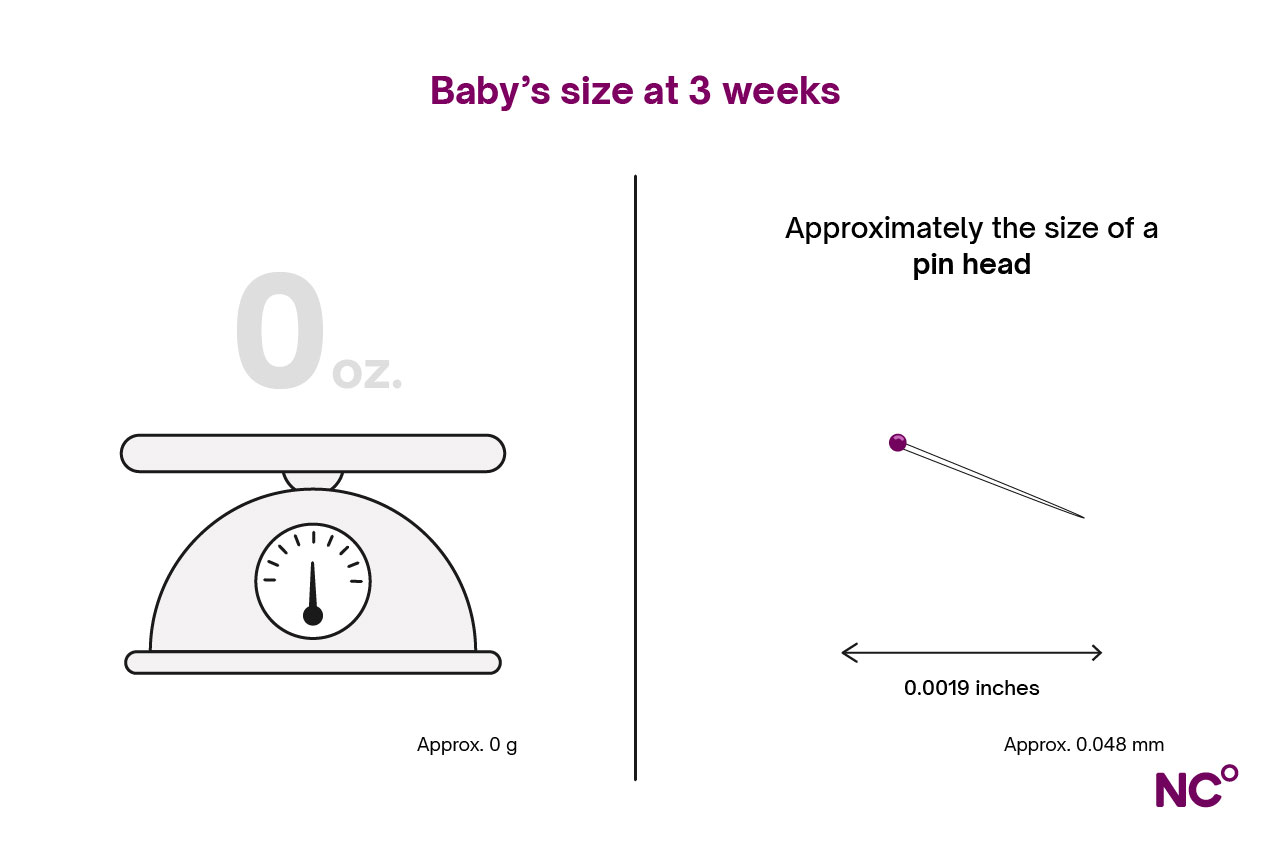3 Weeks pregnant: Pregnancy symptoms & tips
Follows NC° Editorial Policy
At Natural Cycles, our mission is to empower you with the knowledge you need to take charge of your health. At Cycle Matters, we create fact-checked, expert-written content that tackles these topics in a compassionate and accessible way. Read more...
Key takeaways:
- After attempting to get pregnant, you are now in the “two-week wait” until you can take a pregnancy test
- You may experience early pregnancy symptoms, such as breast sensitivity, spotting, and a heightened sense of smell.
- Your baby’s sex is already determined, and it is starting to grow
Welcome to week three of your pregnancy! As a reminder, pregnancy is calculated from the first day of your last period [1] — so at three weeks pregnant, you have attempted to conceive and may be eagerly awaiting the right time to take a pregnancy test. Mixed emotions are common during this time, ranging from excitement to anxious anticipation. In the meantime, if conception is successful, you may notice some early pregnancy symptoms, and the embryo that will become your baby is already starting to grow!
Note: Throughout these early pregnancy articles, we will often refer to your baby as an embryo. Pregnancy is divided into four stages of fetal development, and your baby is technically an embryo until week eight. Read our full article on the difference between an embryo and a fetus to learn more.
Your body at 3 weeks pregnant
Implantation
If your egg is fertilized by a sperm cell (known as conception), that fertilized egg will now be traveling down your fallopian tube toward the uterus, ready for implantation. Implantation occurs when the fertilized egg attaches itself to the lining of the uterus, marking the beginning of pregnancy. You likely won’t notice any symptoms with implantation, though some women may experience implantation bleeding or mild cramps (more on this below).
Two-week wait
While you wait for confirmation of successful conception and implantation, you are in a phase known as the “two-week wait” (TWW). This term describes the time between an attempt to get pregnant and confirmation of pregnancy. This attempt to get pregnant may be through unprotected intercourse timed with ovulation, or fertility treatment such as IUI or IVF.
The TWW begins at ovulation when an egg is released into the fallopian tube. After TWW, you will be able to confirm where conception and implantation have occurred or not, through either a positive pregnancy test or the arrival of your period in the case that you are not pregnant.
Mixed emotions are common during the TWW. You may feel excited about the potential pregnancy or anxious about the upcoming pregnancy test. It is also important to remember that the term “two-week wait” is a broad colloquial term. The average time between ovulation and period ranges, on average, between seven and nineteen days. This duration may be longer or shorter for individuals with irregular cycles [2].
Early pregnancy hormones
From the moment of conception, your hormone levels will start to change. You will begin to produce human chorionic gonadotropin (hCG), also known as the pregnancy hormone, which signals your body to increase levels of progesterone and estrogen [3]. hCG is the hormone tested by home pregnancy tests to confirm pregnancy, though levels will not be high enough to detect until around the end of week four.
Symptoms at 3 weeks pregnant
Though most of us who are expecting will not show any obvious symptoms at week three, early pregnancy symptoms can begin within a week of conception [4]. Note that many of the early symptoms are similar to those of illness or PMS. As pregnancy symptoms occur in the luteal phase, around the same time in your cycle as PMS symptoms would, it can be difficult to differentiate between PMS and pregnancy symptoms.
Missed period
For many, week three will be too early to track a missed period, but it is worth noting that this is the most indicative pregnancy symptom. It is also a very individual experience. Those on an irregular or short cycle may have already noticed a missed period. If you are tracking your period and symptoms, it can be easier to spot when a missed period occurs.
Basal Body Temperature
If you are tracking your basal body temperature (BBT), you likely already know that your BBT varies depending on what stage of your cycle you are in. Typically, your temperature will be higher in the second half of your cycle (the luteal phase) and drop again when your period arrives. If your period is late or lighter than usual, and your BBT remains high after the time of ovulation, this could be an early indicator of pregnancy [5].
Implantation Bleeding
As week three of pregnancy is in the luteal phase of your cycle, it can be hard to pinpoint whether spotting is due to an oncoming period or another cause, such as implantation bleeding. Implantation bleeding is a type of spotting that may occur when the fertilized egg attaches itself to the uterine lining, shedding some blood cells. However, the research surrounding implantation bleeding is not conclusive. There are several reasons bleeding may occur in early pregnancy. In fact, it is thought that up to a quarter of women may experience bleeding in the first trimester [6].
If implantation bleeding does occur, it may be light in flow and last a short length of time. If your bleed is heavier and lasts more than two days, it may be your period instead. Speak to your healthcare practitioner if you are concerned about any spotting or bleeding.
Breast sensitivity
Tender breasts, or breast changes, are a common pregnancy symptom. You may notice that your breasts are more tender, swollen, or heavy than usual. Your nipples may feel particularly sensitive, or you may experience a tingling sensation [7]. Breast pain and sensitivity in pregnancy are thought to be linked to hormonal changes.[4]
Heightened sense of smell
Since as early as the 1800s, pregnant women have reported an increase in their sense of smell sensitivity. More research is needed into the phenomenon, but one proposed evolutionary reason for this increased sensitivity is that it helps mothers protect the embryo from food or environmental toxins [8]. Note that this change in sensitivity to smells applies to both pleasant and unpleasant smells. You may find potent odors, such as fish or garbage, to be even stronger than usual, or notice a change in your perfume preference. Even the scent of your partner can smell different!
Fatigue
Tiredness is a common symptom of early pregnancy, particularly during the first 12 weeks. Although you can’t feel much, at three weeks pregnant, your body is already allocating extra resources and energy to grow the embryo. Increased urination, breast pain, and nausea may interrupt sleep, while hormonal changes and emotions may add to overall fatigue [7].
Your baby’s development at 3 weeks
After fertilization, the fertilized egg begins to duplicate cells and is referred to as a zygote. At week three, about five to six days after fertilization, the zygote transforms into a blastocyst — a group of rapidly dividing cells that eventually become the embryo [9]. This week, your baby is the size of a pinhead. Its weight is 0oz (0 grams), but it is already growing, reaching a length of 0.0019 inches (0.048mm).

Though it is small at this stage, whether your baby will be a boy or a girl has already been decided! Sex is determined at fertilization, though most parents will find out the sex around week 20 through an ultrasound.
Tips at 3 weeks pregnant
Practice self-care during the two-week wait
As mentioned above, you may experience a wide range of emotions during the two-week wait. Take this time to look after your mental health. Practicing yoga or meditation can reduce stress and anxiety. Socializing with friends and family may help brighten your mood. Your favorite TV show may provide comfort, and a walk in nature can help clear your mind.
Avoid alcohol
While you are waiting to find out if you are pregnant, it is a good time to avoid any substances that can cause harm during pregnancy or reduce the potential to get pregnant. You should cut out alcohol altogether, as it can increase the risk of miscarriage, premature birth, and other problems. However, do not be concerned if you have enjoyed a couple of drinks before you knew you were pregnant — the risk is very low as long as alcohol consumption is discontinued [10]. If you need help quitting alcohol, speak to your healthcare provider.
Quit smoking
If you are a smoker, now is the time to look into quitting. Not only is smoking bad for your health, but it also has a huge impact on your growing embryo’s health. Toxins from cigarettes pass onto the embryo, and they experience extra pressure on their heart from a decreased oxygen supply [11]. Stopping smoking will reduce the risk of stillbirth, pregnancy complications, and your baby’s likelihood of developing breathing ailments such as asthma.
Increase folic acid consumption
Eating well is recommended for everyone, especially when trying to conceive or in the early stages of pregnancy. A healthy, balanced diet will help you get all the nutrients your body and baby need. Folic acid, also known as vitamin B9, is recommended in early pregnancy and while trying to conceive. Folic acid is essential in the development of the embryo’s neural tubes, which happens in the first few weeks of pregnancy [12]. Increase your folic acid intake through foods such as legumes, eggs, and cruciferous vegetables like broccoli. Other vitamins that can support pregnancy include vitamin D, iron, and vitamin C. It is essential to consult with your healthcare advisor before you consider taking any supplements.
Keep hydrated
You are drinking for two now! Adequate hydration aids the body’s absorption of nutrients and minerals [13] and can help fight fatigue [14]. Drink plenty of water throughout the day to meet the hydration needs of both you and the embryo. Water should be the go-to, but you can also include decaffeinated teas, sparkling water, or juice. Be cautious of herbal teas, as some are not recommended for consumption during pregnancy.
Following your pregnancy with Natural Cycles
Did you know that you can track your pregnancy and baby development with Natural Cycles? As the first FDA-approved cycle tracking app, NC Follow Pregnancy in the Natural Cycles app gives you week-by-week updates on your growing baby, lets you track your symptoms each day, and will help you take care of your emotional, physical, and mental well-being by offering insights into your body changes throughout your pregnancy.
Did you enjoy reading this article?
